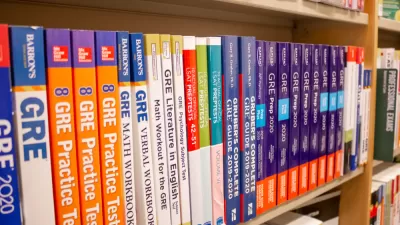As the 2016 admission season winds down, thoughts turn to the 2017 application process. For students considering the idea, there are several good reasons to attend graduate school in 2017, and a few that may cause problems later.

As the 2016 admission season winds down thoughts turn to the 2017 application process. For students wanting to go to planning school in the fall of 2017 the process can take nearly a year—investigating programs, compiling applications, waiting for admission decisions, choosing the best offer, and preparing for program. Why would you want to do this? There are several good reasons to go to graduate school, and a few that may cause problems later.
- You have hit a point in your career where you have substantial questions that you need time to answer. Graduate school can give you a structured way to explore topics from the political strategies and ethical approaches to technical tools and participatory processes. I went back to graduate school in the 1980s in part to understand the newish processes of globalization and also to learn how to use a number of statistical methods that had seemed important in projects I had worked on.
- You want to understand the profession of planning better, including its general approach and specialties. Graduate school can provide a structured way to understand planning’s breadth as well as to delve more deeply into one of its specialties.
These are good reasons and the structure of planning programs is meant to help answer questions and foster understanding of the field and its context. Having a cohort of peers to do this with can being a variety of perspectives and also create a network to draw on over the years.
There are other reasons people contemplate going to graduate school, as well. When the job market is difficult applications go up. People applying before they graduate from their undergraduate program may see graduate school as more familiar than the work world. Still others are working and see the need for a credential to confirm their existing skills. For those looking for credentials, statements of purpose may sound like job letters where the applicant already knows everything about planning.
These are not impossible reasons to go to planning school, though if admitted such students are likely to be less satisfied with the experience. These are the ones who may question why they are studying and not maximize the value they might get if fully ready. Part of the role of admissions committees is to try to make sure—from statements of purpose, resumes, and letters of reference—that applicants really are at a stage where they are eager to engage with important issues. Overall, having good reasons for contemplating grad school is a productive place to start.
Over the years, I have provided substantial advice about various phases of the admissions process. Many topics are linked to the bullets on the top of this page.

Alabama: Trump Terminates Settlements for Black Communities Harmed By Raw Sewage
Trump deemed the landmark civil rights agreement “illegal DEI and environmental justice policy.”

Study: Maui’s Plan to Convert Vacation Rentals to Long-Term Housing Could Cause Nearly $1 Billion Economic Loss
The plan would reduce visitor accommodation by 25% resulting in 1,900 jobs lost.

Planetizen Federal Action Tracker
A weekly monitor of how Trump’s orders and actions are impacting planners and planning in America.

Waymo Gets Permission to Map SF’s Market Street
If allowed to operate on the traffic-restricted street, Waymo’s autonomous taxis would have a leg up over ride-hailing competitors — and counter the city’s efforts to grow bike and pedestrian on the thoroughfare.

Parklet Symposium Highlights the Success of Shared Spaces
Parklets got a boost during the Covid-19 pandemic, when the concept was translated to outdoor dining programs that offered restaurants a lifeline during the shutdown.

Federal Homelessness Agency Places Entire Staff on Leave
The U.S. Interagency Council on Homelessness is the only federal agency dedicated to preventing and ending homelessness.
Urban Design for Planners 1: Software Tools
This six-course series explores essential urban design concepts using open source software and equips planners with the tools they need to participate fully in the urban design process.
Planning for Universal Design
Learn the tools for implementing Universal Design in planning regulations.
Caltrans
Smith Gee Studio
Institute for Housing and Urban Development Studies (IHS)
City of Grandview
Harvard GSD Executive Education
Toledo-Lucas County Plan Commissions
Salt Lake City
NYU Wagner Graduate School of Public Service






























